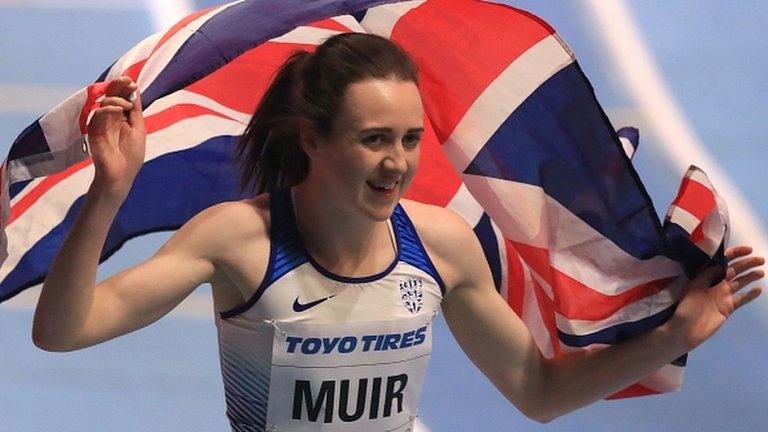How Annie Conway went from weekend fun runner to world champion
- Published
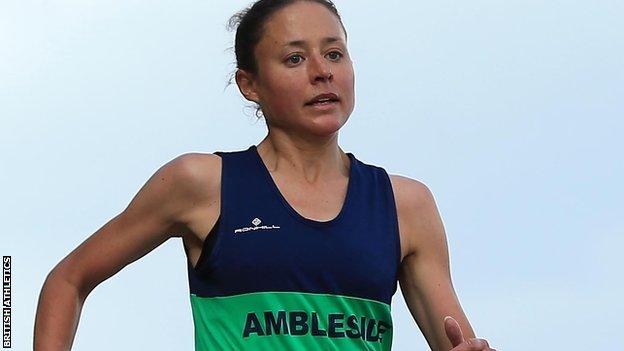
Annie Conway won the 2015 World Long Distance Mountain Running Championships in a record time of four hours 29 minutes one second over 42km
A champion's back story is often as sunny and wholesome as the flipside of a cereal box.
A childhood dream, stoked by a supportive family. A shot of raw talent washed down with a bucketload of honest sweat.
Annie Conway's road to the top of the world started in a pub, amid pint pots and pork scratchings.
In 2008, her husband Terry was working behind a bar, gaining weight and losing fitness.
"He came to a circuits class with me and nearly fainted," remembers Conway, 36. "He realised that he needed to get fit. He started out with just a few runs from the back door."
Conway did swimming and fitness classes, not jogging, but joined him as moral support.
Eight years later - June 2016 - and she had run all the way from her back door to the roof of Europe.
Competing in the World Long Distance Mountain Running Championships in the Slovenian Alps, Conway was sixth at halfway.
With three miles to go she had moved into third. With less than two to go, she overtook Olympic medallist Antonella Confortola to seize the lead.
Conway won in four hours 29 minutes, a record time for a looped course which features 2,800m of climbing - twice the height of Ben Nevis - along its 26-mile length.
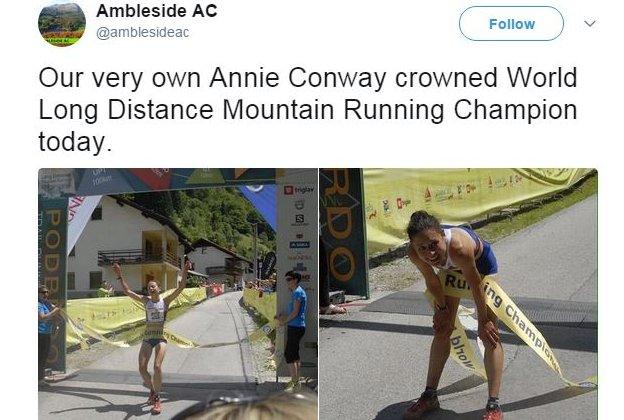
Ambleside Athletics Club gained a world champion with Conway's victory
The way Conway tells it, the transition from Parkruns, external to world champion was just a hobby getting happily out of hand.
"Terry and I had been running for a month or two and decided to do a 10km together - my first ever race," she says. "I ended up finishing third and thought 'maybe I could do this'.
"In 2012 I moved from near Reading to Kendal in the Lake District and started running more regularly near where I lived.
"Initially it was just a few paths and small hills and then I started to go up on to the fells.
"The endorphin rush I got from running made me want to get more.
"It just progressed to running every day and racing more. There were some races abroad - Andorra and the Alps - and in 2015 I went for Great Britain selection and ended up going to the European Championships in Madeira."
Conway's late-20s conversion to the sport would not have been necessary had she not run into the wrong teacher at school.
"When I was about 12, I got tired of always being last in the sprints and field events during athletics and tried cross-country," she says.
"I won races and just seemed to have a lot more stamina. Unfortunately I didn't like the teacher who taught it - he was just a bit weird, a bit of a sergeant major - so I didn't want to do it and concentrated on dance."
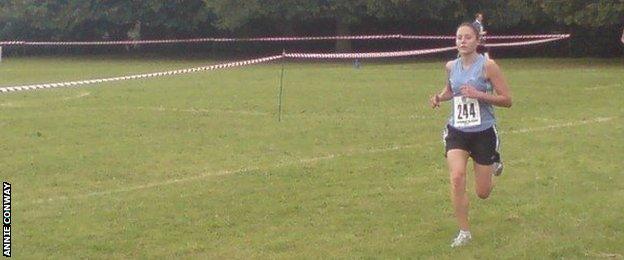
Conway competing in her first senior race, a 10km near Reading in 2008 in which she finished third
If there was some physical ability to be reclaimed from the PE department's lost property, Conway has also taught herself to control the most important muscle in an athlete's body.
It is her work as a psychological therapist, as much as her training in the Lake District, that comes in useful as the pain barrier looms.
"It helps me to stay positive, calm and focused when I get tired and the negative thoughts come in," she says.
"When I am thinking about how far I have to go and how much it hurts, sometimes you think, 'can I be bothered to push myself like this?'
"But then you remember what you have put into it and previous achievements. You have to embrace the pain rather than fight it."
And if that doesn't work as a motivational tool, there are Billy and Memphis.
Conway's pet dogs - a Collie and a Collie-Spaniel-cross - demand three outings a day, whatever the weather.
They are the only competition that Conway likes to bother herself with.
She didn't look up her rivals before winning her world title and doesn't plan to before her defence in Premana, Italy on 6 August.
"I would rather concentrate on my own race, otherwise I get a bit nervous. That is what I did last year and it worked pretty well," she reasons, with some justification.
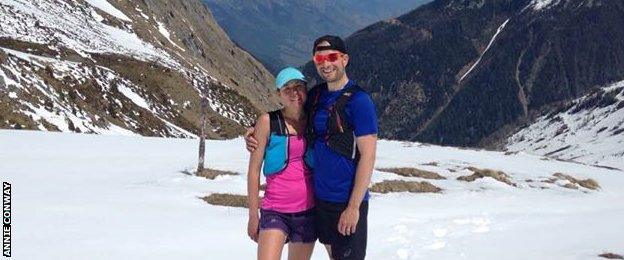
Annie Conway and husband Terry running in Chamonix
Conway, a member of the Ambleside fell running club, is far from alone among British long-distance runners who have made it to the top.
In winning her world title, she was following in the footsteps of 2011 world champion Philippa Maddams, from up the road in Keswick.
European champion Emily Collinge, though based in Italy, is British by birth.
Scotland's Angela Mudge is a bona fide legend of the scene, a serial winner across continents and through different altitudes.
And, for Conway, there is husband Terry as well.
He came home ahead of his wife in that first 10k race - "but only by a couple of minutes," Annie stresses.
His particular poison is not found on the pumps or optics any longer.
He is now an ultra-distance devotee, taking part in monster 100-mile races while Annie focuses on the relatively shorter and steeper events.
Neither are likely to be out of breath in a circuits class any time soon.
- Published3 April 2019
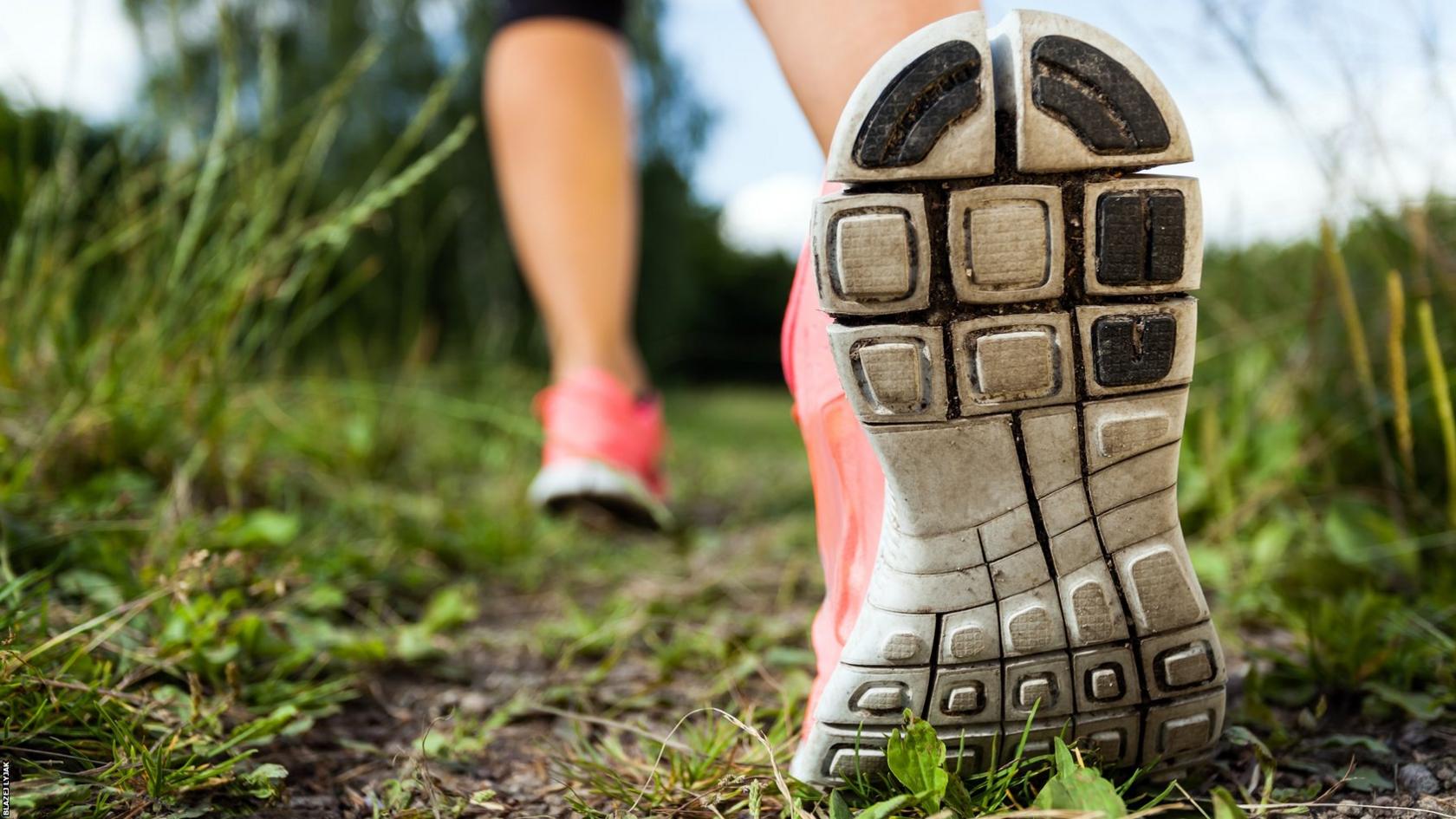
- Published3 March 2018
